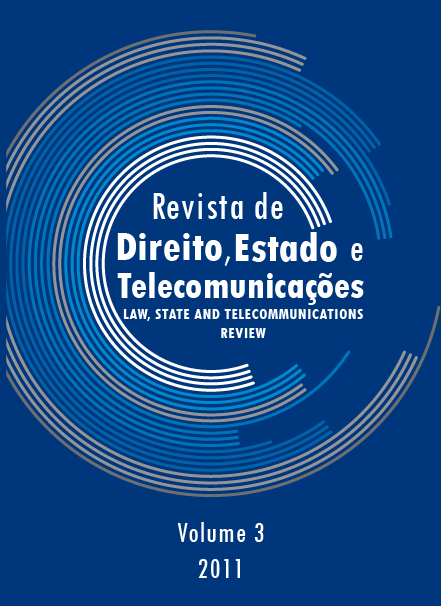Technological Change and Public Policy Agenda Setting: The Broadband Regulation for Universalization in Brazil
DOI:
https://doi.org/10.26512/lstr.v3i1.21668Palabras clave:
mudança tecnológica, agenda política, universalização, banda largaResumen
This paper analyzes the influence of technological change on the public policy agenda setting, especially on the regulatory agenda. In doing so, it analyzes how technological changes that took place in the telecommunication sector have altered the forms of communication in society and how they have imposed changes on the scope of regulatory agenda for universalization (from fixed telephony to broadband services). This analysis is based on a bibliographical and legal framework review. One can observe that, considering technologically dynamic sectors, as telecom, the regulatory agenda for universalization is at odds with technical changes. Thus the constant revision of these agendas is of major importance, so the regulatory entity can guarantee that the universalization of telecom services will constantly be in line with its technological advances.
Referencias
FAVRE, P. (1992). L’émergence des problemès dans le champ politique. In: FAVRE, P. (org.). Sida et politique: Les premiers affrontements, 1981-1987. Paris: L’Harmattan.
FELIZOLA, P. A. M. (2010). A fundamentalidade do direito à comunicação: internet e participação no contexto da sociedade em rede. Políticas públicas de acesso à internet no Brasil. In: Anais da IV Conferência ACORN-REDECOM, Brasília, DF, de 14 e 15 de maio.
FREEMAN, C.; PEREZ, C. (1988). Structural Crisis of Adjustment, Business Cycles and Investment Behaviour. In: DOSI, G. [et al.] (org.). Technical Change and Economic Theory. London: Francis Pinter.
FREY, K. (2000). Políticas públicas: um debate conceitual e reflexões referentes à prática da análise de políticas públicas no Brasil. In: Planejamento e Políticas Públicas 21: 211-259.
JONES, C. (1970). An Introduction to the Study of Public Policy. Belmont: Duxbury Press.
KINGDON, J. (2006). Como chega a hora de uma ideia? In: SARAIVA, E.; FERRAREZI, E. (orgs.). (2006). Políticas públicas: coletânea, Vol. 1. Brasília: ENAP.
MÉNY, Y.; THOENIG, J-C. (1989). Politiques Publiques. Paris: PUF.
MULLER, P. (2009). Les Politiques Publiques. Paris: PUF. (Collection Que sais-je?).
OCDE. (2004). The Implications of Convergence for Regulation of Electronic Communications. Directorate for Science, Technology and Industry.
PADIOLEAU, J-G. (1982). L’État au concret. Paris: PUF.
PEREIRA, P. A. P. (2008). Política Social ”“ Temas e Questões. São Paulo: Cortez.
POPPER, S. (2003). Technological Change and the Challenges for 21st Century Governance. In: TEICH, A.; NELSON, S.; LITA, S.; HUNT, A. (org.). (2003). AAAS Science and Technology Policy Yearbook. Disponível em: http://www.aaas.org/spp/yearbook/2003/yrbk03.htm. Acesso em: maio de 2010.
QIANG, C. Z. W. (2009). Broadband Infrastructure Investment in Stimulus Packages: relevance for developing countries. Banco Mundial.
QIANG, C. Z. W.; ROSSOTTO, C. (2009). Economic Impacts of Broadband. In: Information and Communication for Development 2009. Banco Mundial. Disponível em: http://go.worldbank.org/NATLOH7HV0.
RAMOS, M. C. (2010). Crítica a um Plano Nacional de Banda Larga: uma perspectiva de economia política das políticas públicas. In: Anais da IV Conferência ACORN-REDECOM, Brasília, DF, de 14 e 15 de maio.
ROMANO, J. O. (2009). Política nas políticas: um olhar sobre a agricultura brasileira. Rio de Janeiro: Mauad X e Edur.
SCHUMPETER, J. (1982). A Teoria do Desenvolvimento Econômico. São Paulo: Abril Cultural.
TAPIA, J.; BESSA, V.; DALMAZO, R. (2001). Política de serviço universal e liberalização das telecomunicações: a experiência brasileira no contexto de uma agenda de transição. In: Ensaios FEE 22(1): 261-287.
Descargas
Publicado
Número
Sección
Licencia
Al enviar este documento a la Revista de Derecho, Estado y Telecomunicaciones,
declaro que estoy aceptando los términos de Creative Commons Attribution 4.0 International (CC BY 4.0)


